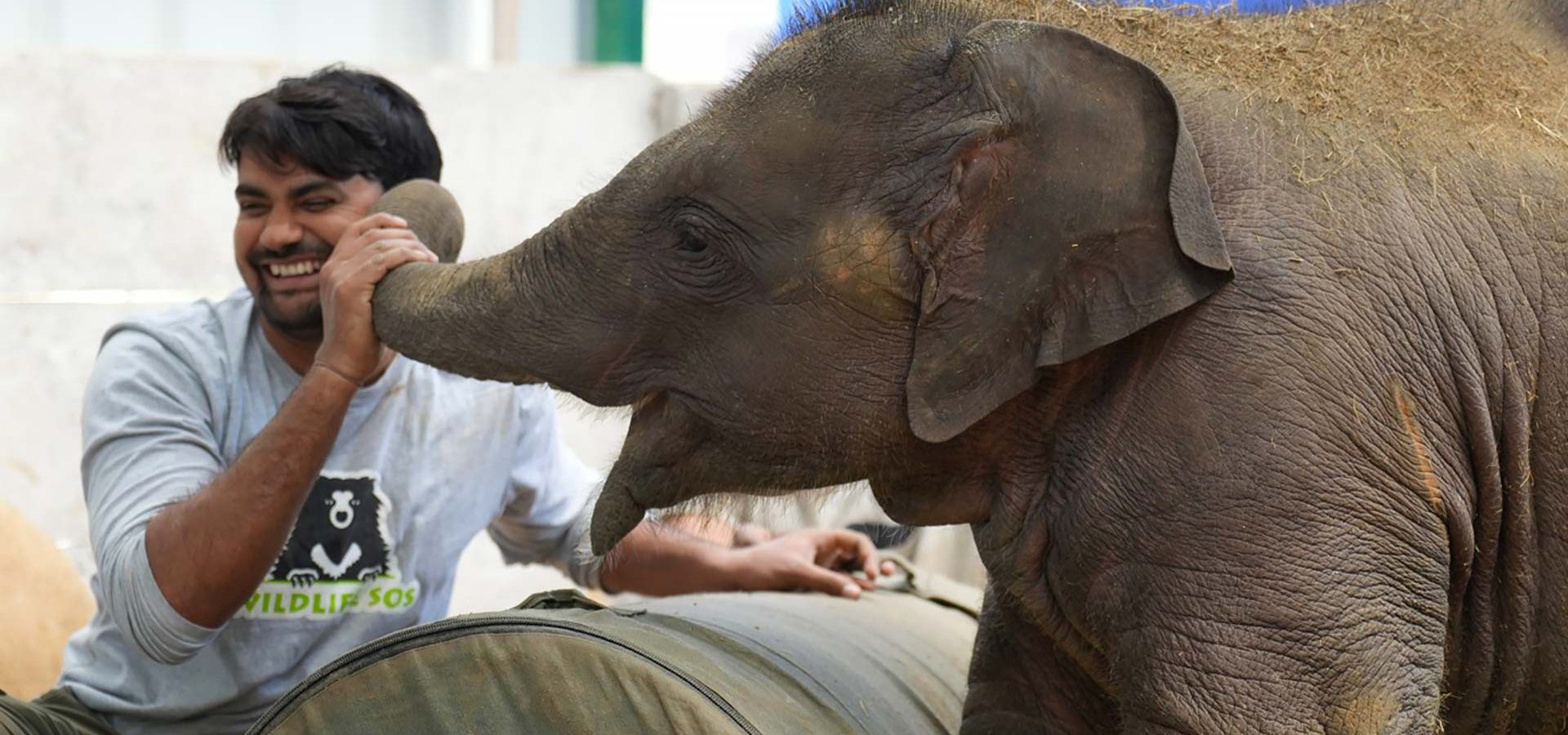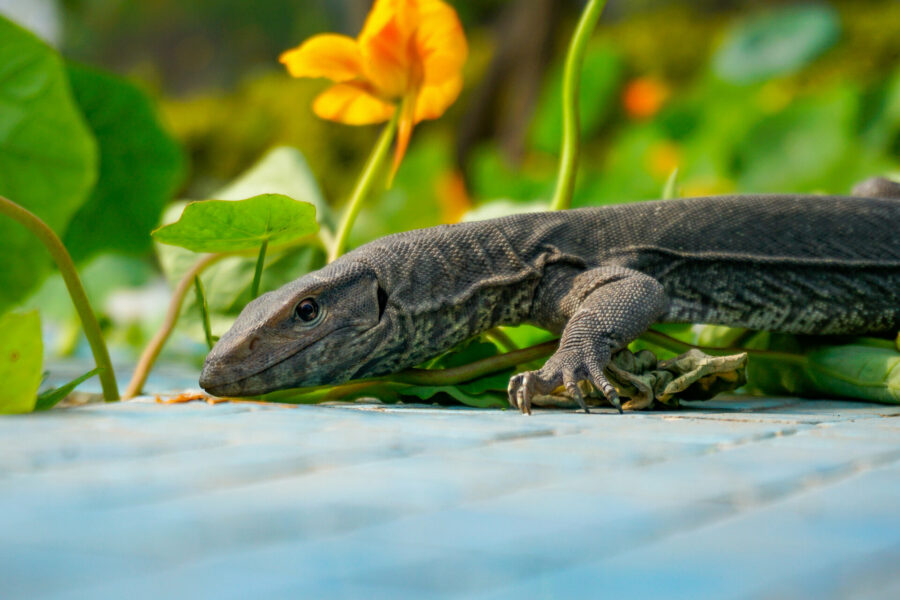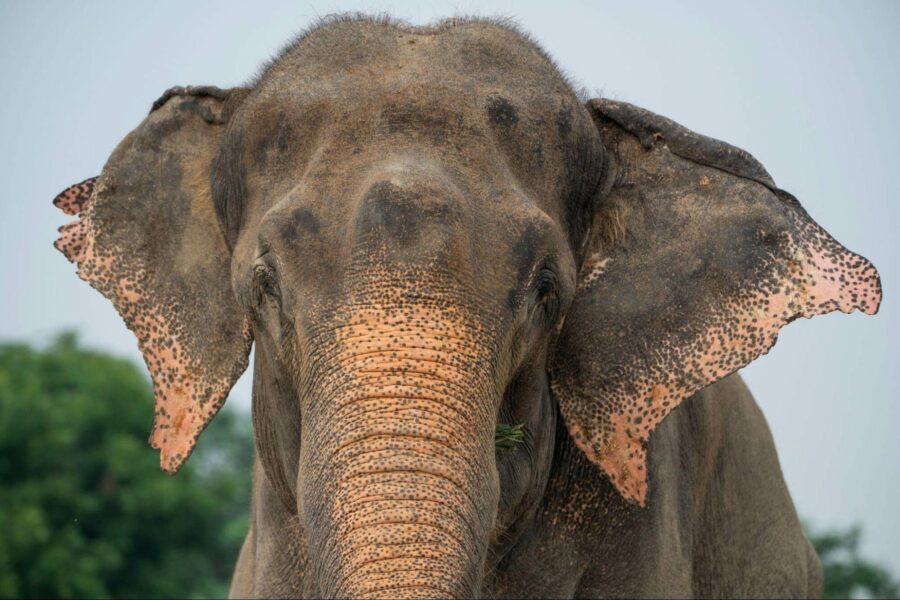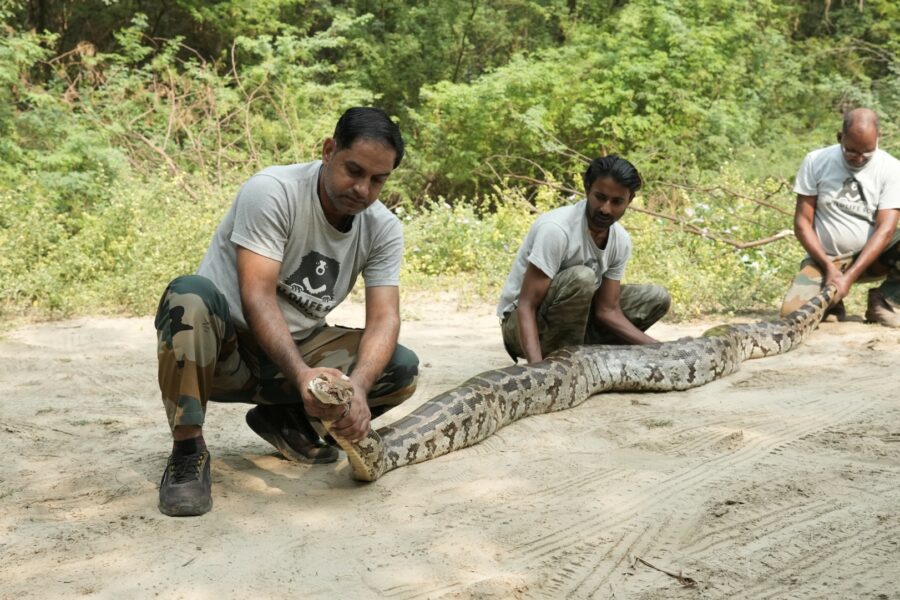They say it takes a village to raise a child. But what about an elephant calf? Raising a calf, especially an orphan, requires its own kind of village, one with warm hearts, dedicated efforts, sleepless nights, and a lot of patience. Elephants are emotional animals, and being separated from maternal or herd support can cause immense stress to the baby. Healing an orphaned calf’s psychological wounds is as crucial as addressing any of its physical injuries. Hence, they must be attended to with extra caution.
Baby Bani arrived at the Elephant Hospital Campus (EHC) with a grave prognosis. Hit by a speeding train and separated from her herd, Bani’s physical plight had been frightful to witness. Along with the painful injuries she had sustained, Bani was diagnosed with spastic paraparesis, a condition caused due to high impact on her spine, which left her in a state of paralysis and prevented her from even standing.
Our team is determined to provide Bani with the best possible care. However, there is a different and challenging concern that lies alongside the treatment of her trauma induced wounds.
Please Sign This Petition
Your voice makes a difference. Ask Indian Railways To Reduce Speeds In Wildlife Corridors!
PROTECT ELEPHANTS FROM SPEEDING TRAINSConsulting numerous doctors and specialists, and supplementing this by carrying out exhaustive research on a baby calf, is proving to be extraordinarily helpful for our team of expert veterinarians to chart out an effective treatment plan for Bani. Here, we highlight some of the valuable inputs considered for the care of a nearly one-year-old infant elephant.
Hygiene and Sanitation
A herd of elephants in the wild acts as a family that is highly protective of their young. The mother elephant nurses her calf for two to four years. From the mother’s milk, infants receive antibodies that make them resistant to diseases they could potentially acquire. It is therefore imperative to establish top quality hygiene while hand-rearing baby Bani, who is close to completing the first year of her life. We must ensure that all she comes in direct contact with are sanitised so that she is not exposed to any external pathogens:
- Caregivers: It is important for caregivers to maintain their personal hygiene before and after tending to an elephant calf. While this excludes every chance of germs being transmitted to Bani, who is currently vulnerable to infections, it also ensures that any infection Bani is susceptible to does not spread to the other elephants under our care.
- Feeding Equipment: It is essential to sterilise the feeding bottles and teats before and after Bani is fed. Along with the bottles, the dishes used for preparation of her meals are also soaked in the hot water for a total of 15 minutes. A mild detergent is utilised to remove coarse stains and bacteria from used equipment.
- Milk Formula: The quantity of milk formula to be created for Bani is judiciously decided to prevent wastage. If there is any leftover of this concoction after her feeding session is complete, it needs to be immediately disposed of so no harmful bacteria and fungi can incubate.
- The Nursery: The area where Bani is being cared for needs to be thoroughly sanitised. Any stool or urine inside this nursery is immediately cleaned up and the area is disinfected to maintain a hygienic environment for Bani. An antiseptic solution containing lime powder and turmeric is used to kill germs and keep the nursery bacteria-free.
- Bedding: Bani arrived at EHC during the winter, which is why her bedding was made of sun-dried paddy straw that would generate adequate warmth for the calf. This bedding was recreated once a week to maintain a fresh and healthy place of rest. In the summer, straw bedding has been replaced by the soil that is softened for Bani, allowing her to comfortably lie down on it. The team has also created several mud beds that provide a cushioning effect to Bani’s body, and even her feet.
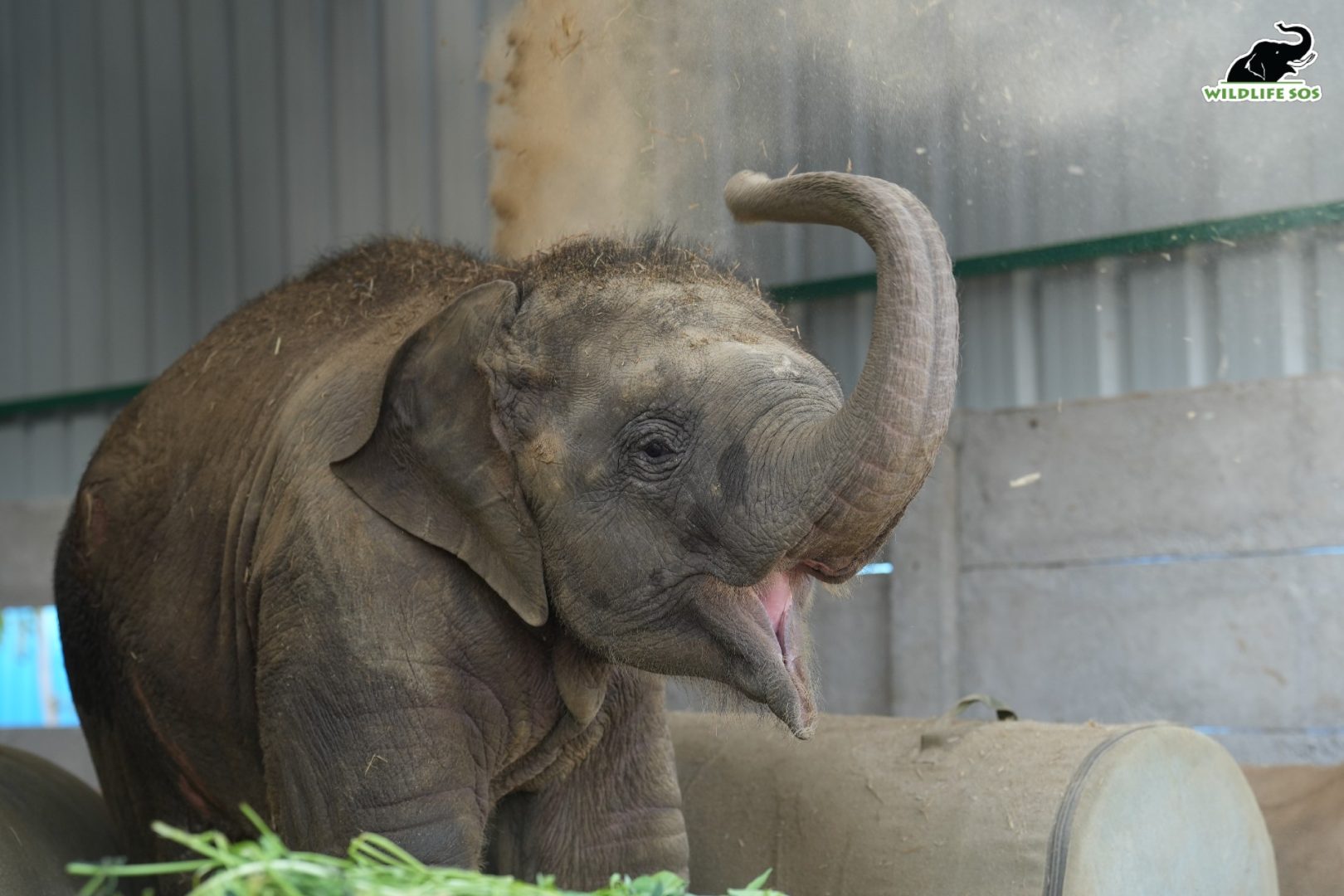
Feeding Approach
Hand-raising Bani requires attention to every detail involved in feeding her. Even a minor setback can pose a risk to the little one.
Bani is being given a milk formula, the temperature of which is matched with Bani’s body temperature. This is because the heat of her body would be at the same level as the milk of her mother would have been, and this helps to closely mimic the natural experience. Elephant calves are sensitive to this, and may reject the formula if there is a slight change in its temperature. Bani’s milk formula is therefore always lukewarm and never cold. Attention given to this aspect is a great way to promote a sense of security in her.
Rescued elephant calves have been known to struggle with bottle feeding instead of suckling. To give Bani a sense of familiarity, the bottle’s teat slightly resembles that of an elephant mother. Bani slowly grew comfortable with this, and her caregivers, who are always next to her, make her feel loved and secure with their kind gestures.
An orphan calf, deprived of its mother’s milk, may experience weakened immunity. The milk formula prepared comprises elements that keeps this and the baby elephant’s nutrition in mind. One litre of milk is mixed in five litres of concentrated cooked porridge made from broken wheat and mung bean, and our caregiving team ensures that Bani drinks this at a controlled pace to prevent any digestive concerns. The positioning of the milk bottle is to be kept perpendicular to her head to ensure smooth digestion. This prevents bloating, and the risk of milk entering her lungs. Bani had initially experienced bloating issues due to her constant recumbency, which was why our team would change her position every six hours so that her trapped gas could be released. Bani’s feeding was scheduled for 5-6 times a day, not more, to avoid overfeeding.
The quantity of food, which includes cooked concentrate, fodder and fruit, is gradually increasing to align with the calf’s growth. Currently, she is consuming 18 litres of porridge, along with 11.5 kgs of fodder, 580gms of roti (Indian bread) made up of ragi or finger millet and wheat flour, and 12 kgs of vegetables and fruits every day. Bani was 267 kgs when she was rescued, and now weighs 315 kgs under vigilant care.
Medical Care
Bani is always accompanied by at least three caregivers, and receives warm oil massages as part of her physiotherapy sessions during the day. Special attention is given to her hind legs, as they were severely affected after the train accident. She was being supported manually to get up on her feet, but consistency of these sessions have led her to now stand for longer periods of time, and pass gas more often. In addition to this, Bani was given medications specifically for pain management, bloating, and paralysis, which, along with general health supplements, were incorporated in her milk formula to ensure that she consumes them easily.
Bani is showing improvement in her physical condition, assuring our team to proceed further with the prescribed medical care being followed.
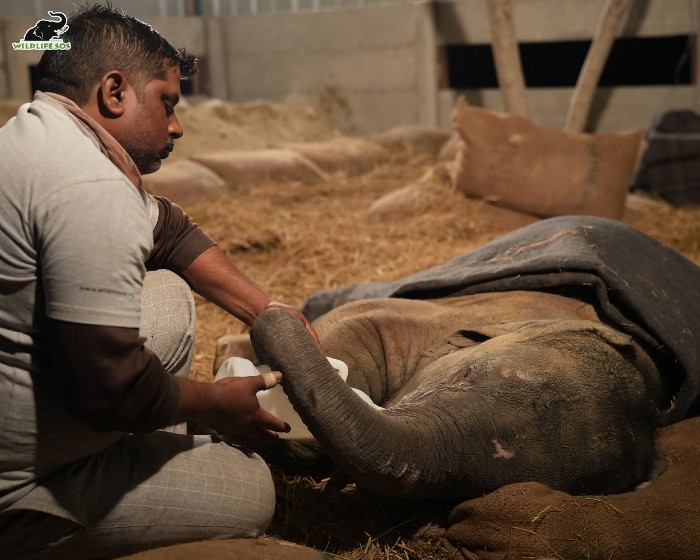
Special Winter Care
Bani arrived at Wildlife SOS’s Elephant Hospital in February 2024, when the temperatures were low. To keep her warm during cold nights, halogen and sodium lamps were installed at a considerable distance and height so that Bani could sleep well. For baby elephants, polythene and plastic sheets should be avoided in their vicinity as they may fiddle with or chew on such objects out of sheer curiosity. Therefore, our team covered Bani with a windcheater, which served as a perfect insulator.
Mud and Water Baths
Mud baths and water baths are activities that elephants are known to indulge in. These baths aid in naturally removing dead skin cells, and in getting rid of ectoparasites. Lack of water and soft earth results in a rough skin and coat, which is why our team ensures that Bani has regular access to mud and water.
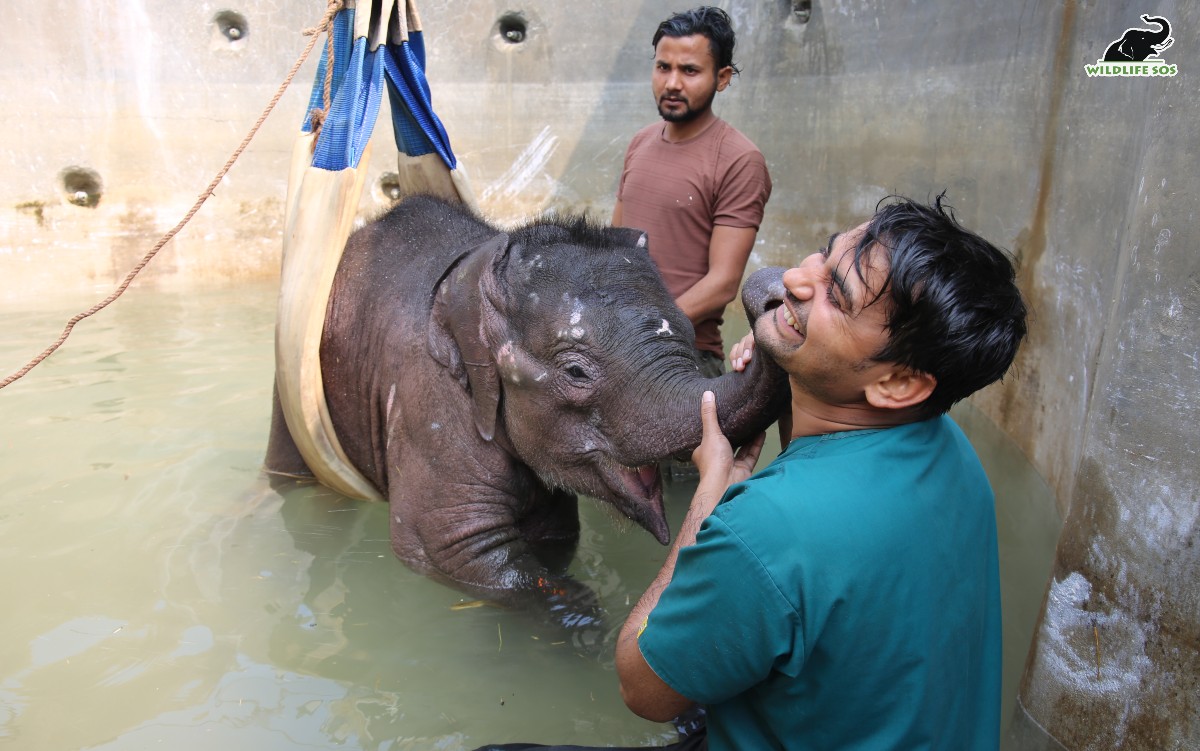
Bath time also allows elephants of all ages to enjoy playtime! Bani’s caregivers keep a bucket of water close to her, and she uses her tiny trunk to collect and splash water all over herself. Not only herself, she sometimes sprays water on her caregivers as well! Bani has shown her mischief and vivacity during this time, and a plan to create a pool near her field is now underway so that the young elephant has access to water whenever she wants.
Enrichments
Enrichments created for rescued and rehabilitated animals provide them opportunities to enhance their natural behaviour and skills. Building enrichments for an elephant calf, a first for our team, has been nothing short of designing toys that she can not only play with, but can also help cultivate her cognitive abilities while doing so. These additions in her daily routine have sparked great excitement in Bani.
GIVE TO BANI’S CARE
Help Little Bani Today! Give to Elephant Rescue and Care.
SUPPORT OUR LIFESAVING WORKOur team of enrichment specialists have recently placed four small haynets filled with fodder, two scratch poles and one tyre enrichment. These enrichments have kept Bani preoccupied, stimulating her curiosity. They have also proved to provide great exercise to her neck and back muscles. Bani’s interest, locomotion, and playfulness — all have been tapped into as she exhibits her natural behaviour. Our skilled team of veterinarians and caregivers are now devising new strategies and innovative ideas for Bani’s enrichments. Engaging with each is sure to boost Bani’s healing, both mentally and physically.

Record-keeping
To keep track of Bani’s overall health, a register has been maintained and is constantly being updated by the attending veterinarians at EHC. This register includes details such as the feeds provided, feeding schedule, quantities offered and consumed, any supplements given, her weight, and daily observations on her behaviours. This meticulous activity of record-keeping helps monitor Bani’s growth and development, ensuring informed decisions about her treatment.
With just a flick of her trunk, Bani manages to melt our hearts! Bani has her own special language that the team is slowly becoming fluent in. Ever since she arrived at EHC, every single day we has gone in planning a bright future for her.
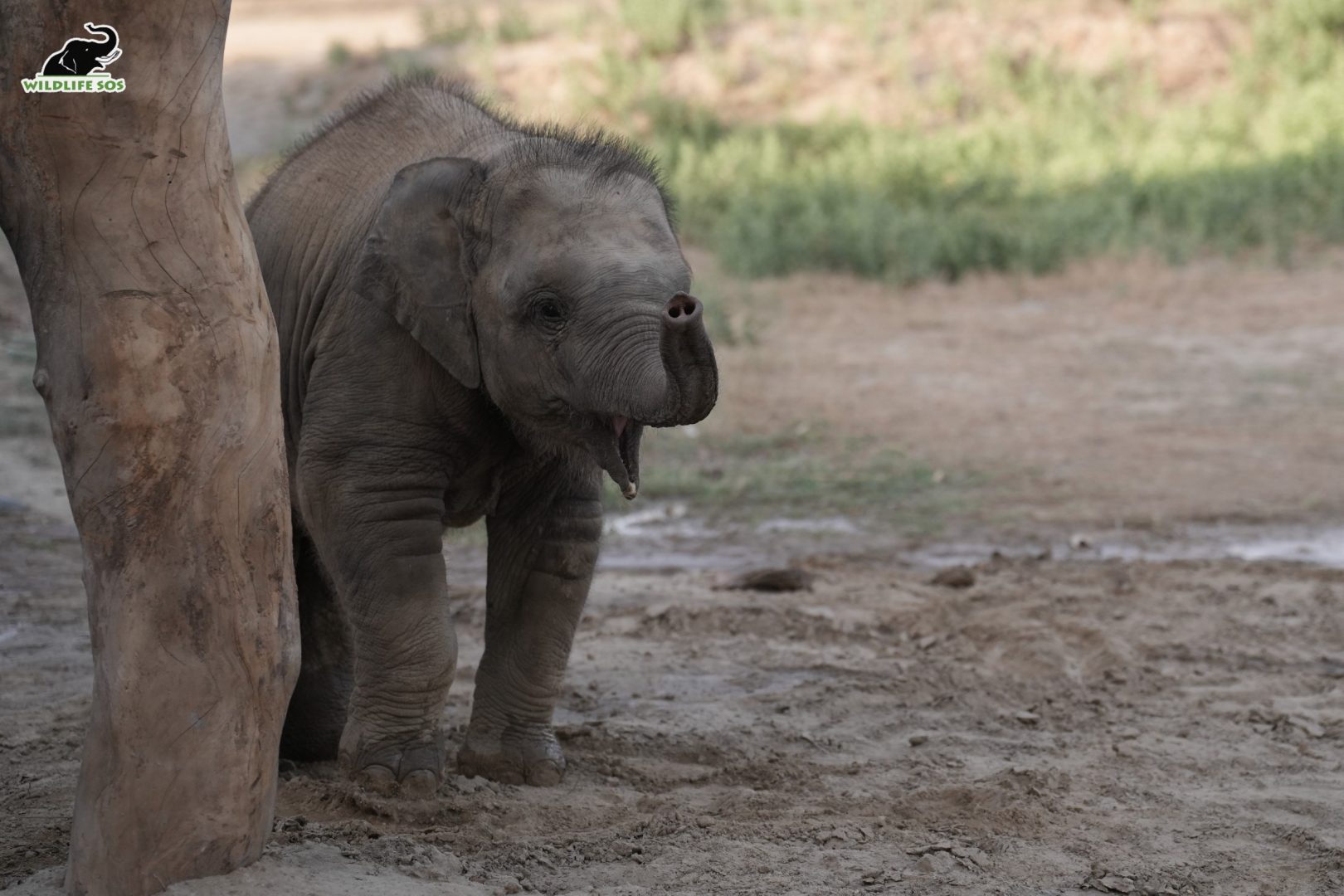
Caring for a baby elephant involves taking cautious steps at each stage, and we are going the extra mile to make sure that Bani heals well. Our caregiving plan has been formulated after consulting with an international team of leading veterinarians, our country’s Ayurvedic experts, acupuncture specialists and orthopedic specialists.
Bani needs your support to rewrite her story on a path gleaming with love and companionship. Come forward to make a donation for baby Bani’s ongoing care.

